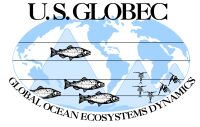August 13, 2002
South fine scale survey continues
8:00 a.m.: The Revelle was greeted with an amazing
sunrise near Bandon this morning due to the thick layer of forest fire
smoke in the air. Otherwise clear skies promise another fine
weather day while the ship continues on the south half of the fine
scale survey.
.jpg) .jpg) .jpg)
With the SeaSoar out of the water until after lunch, the survey will
still take place with the HTI, ADCP, and flow-through system in the
main lab operational. By this evening, the repaired SeaSoar will
be in the water for the remainder of the fine scale survey.
Linda Fayler is shown below working on wiring for the SeaSoar.
.jpg) .jpg) .jpg) .jpg)
4:30 p.m.: A close turn to land near Cape Blanco has put the
Revelle in position to launch a fully restored SeaSoar. The
SeaSoar and ship are now ready to complete the rest of the fine scale
survey which will end near the California border. Once again the
forest fire smoke is clearly visible stretching far out to sea.
.jpg) .jpg) .jpg)
Chief Scientist Report for 13 August 2002
It's been a busy day and a half on the Revelle. As of 1700 PDT on
Tuesday, 8/13, we're back SeaSoaring on the Fine-Resolution South
grid!
Thanks to the OSU Marine Technicians (Marc Willis, Linda Fayler, Chad
Waluk and Toby Martin) for their hard work rebuilding the SeaSoar nose
and
bringing the vehicle back to 100% functionality (more details below).
During the time it took to do the repair, we surveyed lines 7, 7A and
8
with the HTI in the water, the complete flow-thru instrumentation and
the
bird and mammal observers on the O3 deck. Between surveying lines 7
and
7A, during the night, we completed CTD profiles along the FM line at
FM-6,7,8,9 and 10. Combining these with New Horizon's CTD stations
along
the FM line earlier in the day gives us a complete LTOP-quality FM
line.
We found freshly upwelled, low chlorophyll water along these first
three
lines of the South grid, consistent with the strong upwelling
favorable
(southward) winds over the last couple of days. The HTI bioacoustics
instrument showed strong returns in the low frequencies (euphausiids?)
over and inshore of Coquille Bank. The bird and mammal observers
reported
very few whales in this region, in contrast with their count of about
25
individuals along line 8 about nine days ago. Just heard from the R/V
Frosti and they report catching many adult salmon on three stations
they
occupied over the Bank. Although there weren't large numbers of
mammals
along these lines, the top trophic observers logged their 300th
cetacean
sighting. Way to go!
The SeaSoar rebuilding effort involved stripping all the instruments
out
of the vehicle and pulling off the smashed nose. Then a spare SeaSoar
nose was reinstalled, with a little cosmetic surgery, and a new OPC
frame
was attached to the bottom of the vehicle. The OPC instrument was
reattached and newly constructed (thanks Chief Engineer John Downey
and
crew!) ballast weights were hung beneath SeaSoar. The spare OPC does
not
have serial communications as did the lost OPC. So we're running the
OPC
via copper conductors rather than over the fiber optic link. All
communications up and down the cable are working fine. The OSU
MarTechs
took the opportunity to replace the hydraulic unit which drives the
wings
up and down. They then restuffed the vehicle with the CTD and other
instruments and buttoned it up by early afternoon. Another amazing
turnaround from this highly capable group. A big thank you to them!
Our plan is to continue surveying on the Fine-Resolution South grid,
working with the R/V Frosti on line 9 tomorrow (Wednesday) morning. I
estimate we'll complete the grid sometime early Thursday morning.
We'll
then chase the last set of bio-optical drifters in order to do some
station work near them. The final activity will be an abbreviated
version
of the large Mesoscale grid, working our way south to north back to
Newport.
Anticipation heightens for the post-cruise party planned for Monday
8/19
night. I know the R/V Roger Revelle and New Horizon crews are looking
forward to swapping sea stories as their vessels tie up together at
the
OSU Ship Operations dock.
---Jack Barth, Chief Scientist R/V Roger Revelle
filed 2005 PDT August 13 2002
| |
|
Video Clip
August 13, 2002
Guido Corno describes the work going on in the main lab of the R/V
Revelle. |
 Broadband
version Broadband
version
56k version
|
Video Clip
August 13, 2002
Cyndy Tynan describes the work of the Bird and Mammal observation
team on the R/V Revelle. |
 Broadband
version Broadband
version
56k version
|
Previous update August 12
Next update August 14 |


.jpg)
.jpg)
.jpg)
.jpg)
.jpg)
.jpg)
.jpg)
.jpg)
.jpg)
.jpg)



